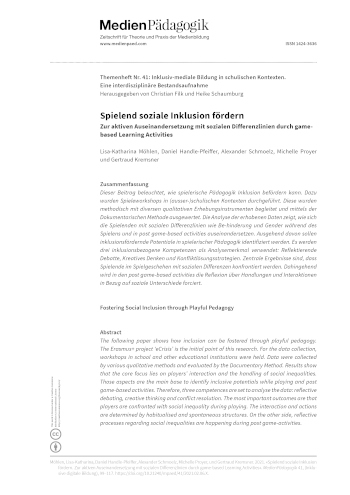Abstract
The following paper shows how inclusion can be fostered through playful pedagogy. The Erasmus+ project ‘eCrisis’ is the initial point of this research. For the data collection, workshops in school and other educational institutions were held. Data were collected by various qualitative methods and evaluated by the Documentary Method. Results show that the core focus lies on players’ interaction and the handling of social inequalities. Those aspects are the main base to identify inclusive potentials while playing and post game-based activities. Therefore, three competences are set to analyse the data: reflective debating, creative thinking and conflict resolution. The most important outcomes are that players are confronted with social inequality during playing. The interaction and actions are determined by habitualised and spontaneous structures. On the other side, reflective processes regarding social inequalities are happening during post game-activities.
References
Biewer, Gottfried, Michelle Proyer, und Gertraud Kremsner. 2019. Inklusive Schule und Vielfalt. Stuttgart: Kohlhammer.
Bohnsack, Ralf. 2003. «Dokumentarische Methode und sozialwissenschaftliche Hermeneutik». Zeitschrift für Erziehungswissenschaft 6 (4): 550-571. https://doi.org/10.1007/s11618-003-0057-7.
Bohnsack, Ralf, Bettina Fritzsche, und Monika Wagner Willi. 2014. Dokumentarische Video- und Filminterpretation. Methodologie und Forschungspraxis. Opladen: Barbara Budrich.
Bothe, Alina, und Dominik Schuh. 2005. Geschlecht in der Geschichte - Integriert oder separiert? Gender als historische Forschungskategorie. Bielefeld: Transkript. https://doi.org/10.14361/transcript.9783839425671.
Cheong, Yun-Gyung, Rilla Khaled, Christoffer Holmgård, und Georgios N. Yannakakis. 2015. «Serious Games for Teaching Conflict Resolution: Modeling Conflict Dynamics». In Conflict and Multimodal Communication, herausgegeben von Francesca D’Errico, Isabella Poggi, Alessandro Vinciarelli, und Laura Vincze, 449–75. Cham: Springer International Publishing. https://doi.org/10.1007/978-3-319-14081-0_21.
de Bono, Edward. 1970. Lateral thinking: creativity step by step. New York: Harper & Row.
Dewey, John. 1933. Democracy and education. Buffalo: Prometheus Books.
Ebner, Martin, und Sandra Schön. 2011. «Lehrbuch für Lernen und Lehren mit Technologien». http://l3t.eu/homepage/das-buch/ebook.
eCrisis. 2018. «eCrisis». www.ecrisis.eu.
Europäische Kommission. 2016. «Active Inclusion». https://ec.europa.eu/social/main.jsp?catId=1059&langId=en.
Fuchs, Peter. 2016. «Inklusion/Exklusion - theoretische Präzisierungen». In Handbuch für Inklusion und Sonderpädagogik, herausgegeben von Ingeborg Hedderich, Gottfried Biewer, Judith Hollenweger und Reinhard Makrowetz, 397-401. Bad Heilbrunn: Klinkhardt.
Gabriel, Sonja. 2007. «Teaching Human Rights with Video Games?» In The 11th European Conference on Game-Based Learning, herausgegeben von Maja Pivec und Joseph Gründer, 191-196. Reading: Acadamic Conferences and Publishing International Limited.
Goodley, Dan, und Katherine Runswick-Cole. 2010. «Emancipating play. Dis/abled children, development and deconstruction». Disability & Society 24 (4): 499-512. https://doi.org/10.1080/09687591003755914.
Hillmann, Karl-Heinz. 1994. Wörterbuch der Soziologie. Stuttgart: Körner.
Hinz, Andreas. 2002. «Von der Integration zur Inklusion - terminologisches Spiel oder konzeptionelle Weiterentwicklung?» Zeitschrift für Heilpädagogik 53: 354-361.
Husband, Charles. 2007. «Social Work in an Ethically Diverse Europe. The Shifting Challenges of Difference». Social Work and Society 5 (3): 1-18. https://ejournals.bib.uni-wuppertal.de/index.php/sws/article/view/138
Iske, Stefan, und Dan Verständig. 2014. «Medienpädagogik und die Digitale Gesellschaft im Spannungsfeld von Regulierung und Teilhabe». Medienimpulse 4: 1-13. https://doi.org/10.21243/mi-04-14-07.
Le, Son, Peter Weber, und Marin Ebner. 2013. «Game-Based Learning. Spielend Lernen?» In L3T. Lehrbuch für Lernen und Lehren mit Technologien, herausgegeben von Martin Ebner und Sandra Schön. Zugriff am 29. Juni 2019 https://www.pedocs.de/volltexte/2013/8352/pdf/L3T_2013_Le_Weber_Ebner_Game_Based_Learning.pdf
McGonigal, Jane. 2011. Realtiy is Broken. Why Games Make us Better and How They Can Change the World. New York: The Penguin Press.
Michael, David, und Sande Chen. 2011. Serious games: Games that educate, train, and inform. Ohio: Course Technology.
Miller, Monika, und Alicia Summers. 2007. «Gender Differences in Video Game Characters’ Roles, Appearances, and Attire as Portrayed in Video Game Magazines». Sex Roles 56 (7-8): 733-742. https://doi.org/10.1007/s11199-007-9307-0.
Miettinen, Reijo. 2000. «The concept of experiential learning and John Dewey‘s theory of reflective thought and action». International Journal of Lifelong Education 19 (1): 54-72. https://doi.org/10.1080/026013700293458.
Prensky, Marc. 2001. Digital Game-Based Learning. New York: McGraw-Hill.
Przyborski, Aglaja, und Wohlrab-Sahr. 2009. Qualitative Sozialforschung: Ein Arbeitsbuch. München: Oldenbourg Wissenschaftsverlag.
Schmoelz, Alexander. 2016. «Ernsthafte Spiele als Anlass für Ko-Kreativität?» In Game Based Learning. Dialogorientierung & spielerisches Lernen analog und digital, herausgegeben von Johann Haag, Joseph Weißenböck, Wolfgang Gruber und Christian Freisleben-Teuscher, 107-118. Brunn am Gebirge: IKON.
Schmoelz, Alexander. 2017. «On Co-Creativity in Playful Classroom Activities». Creativity: Theories - Research - Applications 4 (1): 25-64. https://doi.org/10.1515/ctra-2017-0002.
Schmoelz, Alexander. 2018. «Enabling co-creativity through digital storytelling in education». Thinking Skills and Creativity 28: 1–13. https://doi.org/10.1016/j.tsc.2018.02.002.
Schmoelz, Alexander, Gertraud Kremsner, Michelle Proyer, Daniel Pfeiffer, Lisa-Katharina Möhlen, Kosta Karpouzis, und Gerogios Yannakakis. 2017. «Inklusiver Unterricht mit Digitalen Spielen». Medienimpulse 2: 1-15. https://doi.org/10.21243/mi-02-17-07.
Stenning, Keith, Alexander Schmoelz, Heather Wren, Elias Stouraitis, Theodore Scalsas, Constantine Alexopoulos, und Amelie Aichhorn. 2016. «Socratic dialogue as a teaching and research method for co-creativity?» Digital Culture & Education 8 (2): 154–168. https://www.digitalcultureandeducation.com/volume-82-papers/socratic-dialogue-as-a-teaching-and-research-method-for-co-creativity.
Ting-Toomey, Stella, und John Oetzel. 2001. Managing Intercultural Conflict Effectively. Thousand Oaks: CA.
UNESCO. 2005. «Guidelines for Inclusion. Ensuring Access to Education for All». Paris: UNESCO.
Voida, Amy, Sheelagh Carpendale, und Saul Greenberg. 2009. «The Mii and the Wii: Emphasizing the Individual and the Group in Console Gaming». Research Report 2009: 931-10, Department of Computer Science, University of Calgary, Calgary, Alberta T2N 1N4, Canada.
Waldschmidt, Anne. 2005. «Disability Studies: Individuelles, soziales und/oder kulturelles Modell von Behinderung?» Psychologie und Gesellschaftskritik 29 (1): 9-31. https://nbn-resolving.org/urn:nbn:de:0168-ssoar-18770.
Yannakakis, Georgios, Julian Togelius, Rilla Khaled, Arnav Jhala, Kostas Karpouzis, Ana Paiva, und Asimina Vasalou. 2010. Siren: Towards Adaptive Serious Games for Teaching Conflict Resolution. 4th European Conference on Games Based Learning, Copenhagen. http://www.image.ece.ntua.gr/papers/640.pdf.

